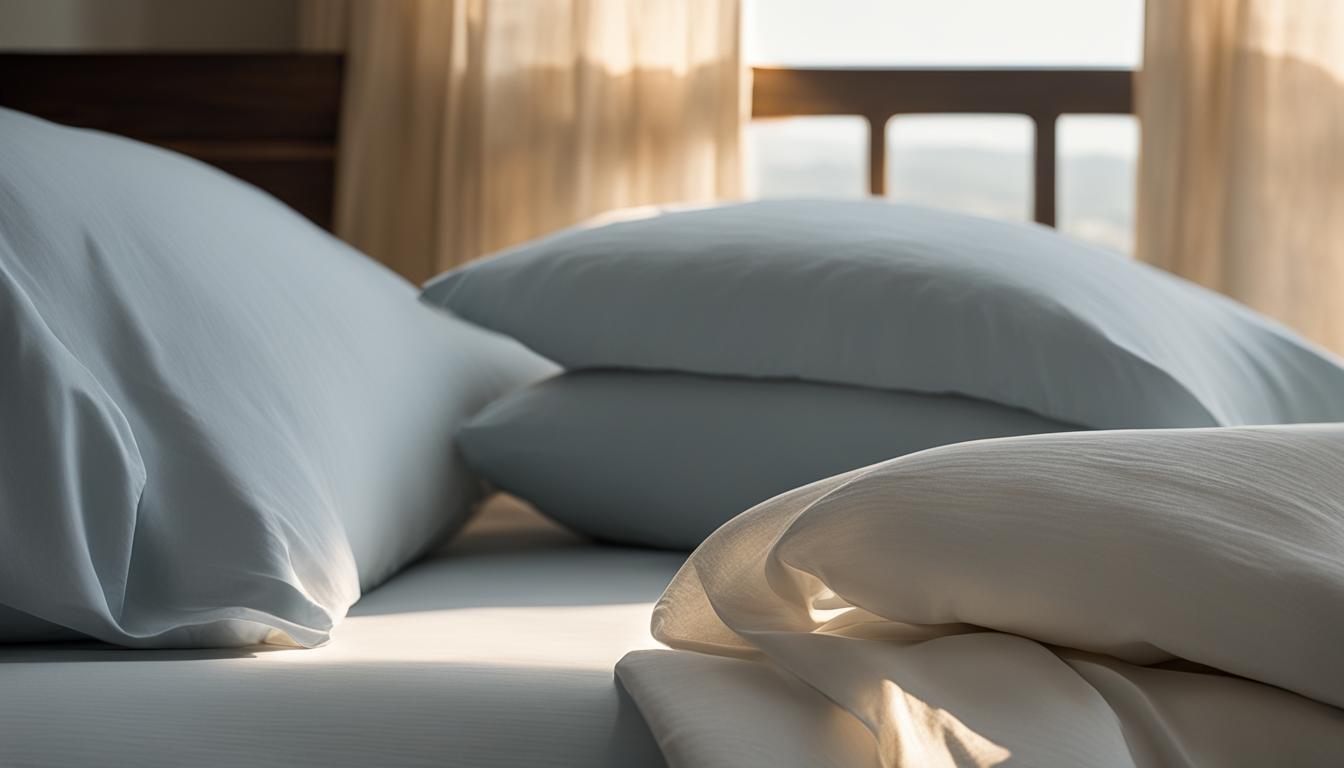Are you struggling to get a good night’s sleep? Incorporating healthy sleep habits into your routine can make a world of difference in the quality of your rest. By following these simple sleep hygiene tips, you can improve your sleep patterns and wake up feeling refreshed and rejuvenated.
Creating a sleep-friendly bedroom environment is key. Optimize your sleep environment by adjusting the temperature, dimming the lights, and selecting comfortable bedding. Establishing a consistent sleep schedule helps regulate your body’s internal clock and promote better sleep.
Practicing good sleep hygiene involves adopting healthy bedtime routines and activities. Wind down before bed with relaxation techniques and avoid using electronic devices that can disrupt your sleep. By prioritizing daily wellness habits, such as getting exposure to daylight, maintaining a consistent sleep schedule, and managing stress, you can further enhance the quality of your sleep.
Remember, healthy sleep habits are crucial for your overall well-being. Implementing these tips into your daily routine will help improve your sleep patterns and promote restorative sleep. Wake up feeling re-energized, ready to take on the day!
Key Takeaways:
- Creating a sleep-friendly bedroom environment is essential for better sleep
- Practicing good sleep hygiene involves adopting healthy bedtime routines and avoiding electronic devices
- Prioritizing daily wellness activities, such as exposure to daylight and stress management, can improve sleep quality
Create a Sleep-Friendly Bedroom Environment
Your bedroom environment plays a crucial role in optimizing your sleep environment and promoting healthy sleep habits. To create an ideal sleep sanctuary, it’s essential to prioritize factors that contribute to a restful atmosphere.
Optimizing the Bedroom Temperature
Did you know that the ideal temperature for quality sleep is between 60 and 67 degrees Fahrenheit (15 to 19 degrees Celsius)? Adjusting your room temperature to align with this range can help you fall asleep faster and stay asleep throughout the night.
Keeping the Bedroom Dark and Quiet
Light and noise can disrupt your sleep patterns. Invest in blackout curtains or shades to block out external light sources, such as streetlights or early morning sun. Additionally, consider using earplugs or a white noise machine to minimize any disturbances that might interfere with your sleep.
Selecting Comfortable Bedding
Comfortable bedding is essential for a good night’s sleep. Your mattress, pillows, and sheets should provide adequate support and comfort, allowing you to relax and drift off to sleep effortlessly. Look for high-quality materials and choose bedding that suits your personal preferences.

By creating a sleep-friendly bedroom environment that optimizes the temperature, minimizes light and noise, and offers comfortable bedding, you can set the stage for a restful night of sleep. Remember, a calm and inviting sleep environment can significantly improve the quality of your rest and contribute to overall well-being.
Practice Good Sleep Hygiene
When it comes to improving your sleep, practicing good sleep hygiene is essential. By adopting healthy habits and routines, you can promote better sleep quality and overall well-being. One of the key aspects of sleep hygiene is establishing a regular bedtime routine.
A bedtime routine helps signal to your body that it’s time to wind down and prepare for sleep. Consider incorporating activities that promote relaxation, such as reading a book, taking a warm bath, or practicing deep breathing exercises.
Avoiding the use of electronic devices close to bedtime is also crucial. The blue light emitted by screens can interfere with your body’s natural sleep-wake cycle, making it harder for you to fall asleep. Instead, opt for wind-down activities that don’t involve staring at a screen, like listening to calming music or practicing gentle stretching.
Relaxation Techniques
Relaxation techniques can play a significant role in improving your sleep hygiene. These techniques help calm your mind and body, making it easier for you to drift off to sleep. Consider trying techniques such as:
Progressive Muscle Relaxation: This involves tensing and then releasing each muscle group in your body, from your toes to your head.
Guided Imagery: Visualize a peaceful and serene setting, such as a beach or a forest, to promote relaxation and reduce stress.
Deep Breathing Exercises: Take slow, deep breaths, focusing on your breath and letting go of any tension or worry.
By incorporating relaxation techniques into your wind-down routine, you can create a calm and soothing atmosphere that prepares your mind and body for a restful night’s sleep.
Avoiding Electronic Devices
Avoiding electronic devices close to bedtime is crucial for good sleep hygiene. The blue light emitted by devices such as smartphones, tablets, and laptops can disrupt your body’s natural sleep rhythm. This can lead to difficulty falling asleep and decreased sleep quality.
Instead of scrolling through social media or watching TV right before bed, consider engaging in screen-free activities. You can read a book, practice yoga or meditation, enjoy a warm herbal tea, or journal about your day. These activities will help you wind down and prepare for a restful night’s sleep.
Remember, establishing a regular bedtime routine, incorporating relaxation techniques, and avoiding electronic devices are all essential components of good sleep hygiene. By making these habits a part of your daily routine, you can improve the quality of your sleep and wake up feeling refreshed and rejuvenated.

Prioritize Daily Wellness for Better Sleep
Your daily wellness habits play a crucial role in determining the quality of your sleep. By prioritizing activities that support good sleep, you can improve your overall sleep patterns and wake up feeling refreshed and rejuvenated. Here are some essential habits to incorporate into your daily routine:
1. Get Exposure to Daylight

Spending time outdoors and getting exposure to natural daylight can have a significant impact on regulating your body’s internal clock. Daylight exposure helps promote wakefulness during the day and signals to your body that it is time to sleep at night. So make it a point to spend time outside each day, whether it’s going for a walk, sitting in a park, or simply enjoying your morning coffee on a sunny patio.
2. Maintain a Consistent Sleep Schedule
Establishing a consistent sleep schedule helps synchronize your body’s internal clock and promotes better sleep. Try to go to bed and wake up at the same time every day, even on weekends. This consistency trains your body to recognize when it’s time to sleep and helps improve the quality of your rest.
3. Follow a Healthy Diet
A well-balanced and nutritious diet can positively impact your sleep. Avoid consuming heavy meals close to bedtime and limit your intake of caffeine and alcohol, as both can disrupt your sleep patterns. Instead, opt for sleep-friendly foods such as cherries, bananas, almonds, and herbal teas known for their calming properties.
4. Manage Stress Effectively
Stress and anxiety can often interfere with your ability to fall asleep and stay asleep. Incorporate stress management techniques into your daily routine, such as practicing mindfulness, deep breathing exercises, or engaging in activities that help you relax and unwind before bed. By managing stress effectively, you can create a more peaceful and conducive environment for sleep.
By prioritizing daily wellness habits that include exposure to daylight, maintaining a consistent sleep schedule, following a healthy diet, and managing stress, you can significantly improve the quality of your sleep. These habits not only enhance your overall well-being but also contribute to a healthier and more fulfilling lifestyle.
Conclusion
Implementing healthy sleep habits is crucial for improving your sleep patterns and experiencing restorative sleep. By incorporating these tips into your daily routine, you can enhance the quality of your sleep and overall well-being. Prioritizing sleep hygiene and creating a sleep-friendly environment can have a profound impact on your sleep patterns and contribute to a healthier and more fulfilling lifestyle.
Remember to establish a consistent sleep schedule and create a bedroom environment that promotes relaxation. Optimize the temperature, keep the room dark and quiet, and choose comfortable bedding. Practicing good sleep hygiene, such as following a bedtime routine and engaging in relaxing activities before sleep, can signal to your body that it’s time to rest.
Additionally, prioritize your daily wellness habits. Get exposure to daylight, maintain a healthy diet, manage stress, and engage in activities that support better sleep. These habits can help regulate your body’s internal clock and promote a more restful sleep.
By embracing healthy sleep habits, you pave the way for restorative and rejuvenating sleep. Make these tips a part of your daily routine and experience the positive impact they have on the quality of your sleep. Wake up feeling refreshed, energized, and ready to tackle the day ahead.
FAQ
What are healthy sleep habits?
Healthy sleep habits, also known as sleep hygiene, are practices and routines that promote better sleep quality. They include maintaining a consistent sleep schedule, creating a sleep-friendly bedroom environment, practicing a regular bedtime routine, and avoiding disruptive activities close to bedtime.
How can I create a sleep-friendly bedroom environment?
To create a sleep-friendly bedroom, you can optimize the temperature of your room, keep it dark and quiet, and choose comfortable bedding. These factors can contribute to a more relaxing and comfortable sleep environment.
What is a bedtime routine, and why is it important?
A bedtime routine is a set of relaxing activities that you engage in before sleep, such as reading a book, taking a warm bath, or practicing relaxation techniques. Having a consistent bedtime routine signals to your body that it is time to wind down and prepare for sleep, resulting in better sleep quality.
Why should I avoid electronic devices before bed?
The blue light emitted by electronic devices such as smartphones, tablets, and laptops can interfere with your body’s natural sleep-wake cycle. It suppresses the production of melatonin, a hormone that helps regulate sleep. Avoiding electronic devices close to bedtime can help improve your sleep quality.
How can daily wellness habits improve my sleep quality?
Prioritizing activities such as getting exposure to daylight, maintaining a consistent sleep schedule, eating a healthy diet, and managing stress can have a positive impact on your sleep quality. These habits support your body’s natural sleep-wake cycle and promote relaxation, leading to better overall sleep.
Why are healthy sleep habits important for restorative sleep?
Healthy sleep habits are essential for achieving restorative and rejuvenating sleep. By incorporating these habits into your daily routine, you can improve the quality of your sleep, enhance your overall well-being, and wake up feeling refreshed and energized.
Source Links
- https://www.mayoclinic.org/healthy-lifestyle/adult-health/in-depth/sleep/art-20048379
- https://www.sleepfoundation.org/sleep-hygiene/healthy-sleep-tips
- https://www.sleepfoundation.org/sleep-habits


